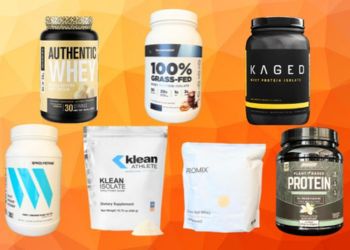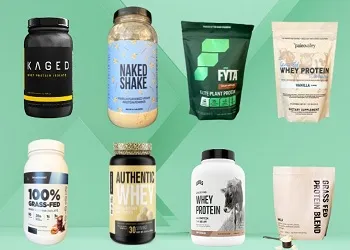Lysine is an essential amino acid (EAA) that’s mainly found in animal products. It’s used as a substrate for building proteins and is required for carnitine synthesis. Lysine supplements offer benefits for gut health, calcium absorption, cold sore healing and prevention, anxiety reduction, and blood sugar regulation.
Quick Look
- Lysine is an EAA that cannot be synthesized in the body. It’s found primarily in high-protein, animal-based foods.
- Supplementing with lysine has shown benefits for treating and preventing cold sores, reducing anxiety, improving calcium absorption, and accelerating wound healing.
- The recommended intake for lysine ranges from 800 to 3,000 mg per day. The average intake for glycine supplements is between 1 to 3 grams to treat specific conditions.
- Red meat, poultry, and dairy contain some of the highest amounts of dietary lysine.
Table of Contents
What Are Lysine Supplements?
Lysine is an essential amino acid that serves as a building block for proteins. All EAAs are required for the formation of functional proteins and normal growth and development, but lysine plays unique roles in other areas, such as the crosslinking of collagen polypeptides, nutrient uptake, and the production of carnitine, which is important for fatty acid metabolism.
It’s time for a quick chemistry lesson before we touch on the lysine amino acid benefits.
Most EAAs are stereoisomers, meaning they exist in two forms that are identical to one another as mirror images:
- D-Lysine
- L-Lysine
The L-form is the one we are most familiar with and is used in protein synthesis, which is why it’s the form found in food and lysine supplements.
So, what does lysine do(in supplement or food form)?
- It’s one of the best nutrients for relieving and preventing cold sores.
- It can offer support for anxiety.
- It’s essential for carnitine synthesis, which is part of fatty acid metabolism.
- It promotes the absorption of calcium.
- It aids the body in collagen synthesis.
Let’s dig deeper into the health benefits of lysine.
Essential Amino Acids vs Non-Essential Amino Acids

The 20 amino acids are broken down into three categories:
- Essential amino acids: These amino acids cannot be synthesized endogenously (in the body) and must come from external sources (food or supplements).
- Non-essential amino acids: These amino acids are synthesized endogenously by combining essential amino acids.
- Conditionally essential amino acids: These amino acids are synthesized endogenously but in insufficient amounts to support the body’s requirements in certain circumstances. During specific physiological periods of growth, such as pregnancy, adolescent development, or recovery from trauma, these amino acids become essential.
The table below summarizes the 20 amino acids and their respective categories.
| Essential | Non-essential | Conditionally essential |
|---|---|---|
| Phenylalanine | Alanine | Arginine |
| Valine | Aspartic acid (aspartate) | Cysteine |
| Tryptophan | Asparagine | Glutamine |
| Threonine | Glutamic acid (glutamate) | Glycine |
| Isoleucine | Selenocysteine | Proline |
| Methionine | Serine | |
| Histidine | Tyrosine | |
| Leucine |
Lysine Amino Acid Benefits
Thanks to its role in producing functional proteins, lysine plays several important roles in the body and offers a range of health benefits.
Protects Against Cold Sore Formation

Have you ever had a nasty blister-like sore on your lip? It’s called a cold sore, and it results from the Herpes simplex virus Type 1 (HSV-1). Cold sores are an infection that often appears on the lips and corners of the mouth and frequently causes tingling, pain, or discomfort.
Cold sores are contagious, but they often arise during periods of stress or a weakened immune system.
Some research suggests that lysine supplements may help prevent HSV-1 from replicating and reduce the duration of a cold sore. Arginine, another amino acid, is needed for the virus to multiply, and lysine offers two strategies to prevent this:
- Interferes with the formation of capsid proteins and DNA via competitive antagonism with arginine
- Promotes an increase in arginase activity, increasing the catabolism of arginine
That said, studies show mixed results for lysine supplementation on HSV-1. One review concluded that taking less than 1 gram of lysine daily did not prevent cold sores in people who consumed adequate amounts of dietary arginine. However, increasing the lysine dose to more than 3 grams daily did improve cold sore symptoms.
On the other hand, some evidence shows lysine is effective for cold sores. One study found that 87% of people with a cold sore using a cream containing L-lysine, herbs, and zinc showed improvement in just six days; cold sores typically last around 21 days, suggesting it may significantly shorten the lifespan of the cold sore.
Key takeaway: Some research suggests lysine supplementation can help shorten the duration of cold sores, but the evidence is largely mixed as to whether it can prevent the formation to begin with.
May Reduce Anxiety

In 2019, it was estimated that 301 million people globally suffered from some sort of anxiety disorder, making it the most common of all mental disorders.
Although there are several routes for the treatment of anxiety, EAAs aren’t typically one we think of first. However, research suggests lysine may play an important role in mitigating symptoms of anxiety. One of the ways it may do this is by enhancing calcium absorption (we’ll talk more about this shortly). Calcium is important for mental health, and studies suggest that higher calcium intake was linked to lower perceived stress, higher positive mood scores, better resiliency, and lower prevalence of anxiety and rumination.
In addition to helping your body absorb calcium more efficiently, lysine also acts like a serotonin receptor antagonist, meaning it partially binds to serotonin receptors to reduce and/or prevent anxiety responses.
One study of 108 people found that combination supplementation with lysine and arginine normalized hormonal stress responses in people prone to anxiety and reduced salivary cortisol levels. Another study found similar results, with lysine supplementation—4.2 g/kg—reducing anxiety scores in men with high-stress levels.
Key takeaway: Supplementing with lysine may help to improve symptoms of anxiety by enhancing calcium absorption and acting as a serotonin receptor antagonist.
Aids Calcium Absorption

Calcium is an essential mineral most people associate with bone health, but it has a bigger role. Sufficient intake of calcium is also necessary for muscle growth and strength, nerve signal transmission, blood flow, and hormone and enzyme production.
In addition to vitamin D, lysine is important for promoting calcium absorption. Research suggests that lysine increases calcium absorption in the gut and helps the kidneys retain this mineral.
There are no studies directly addressing lysine supplementation and osteoporosis, but one study of 30 women, 15 of whom had osteoporosis, found that supplementing with calcium and lysine reduced urinary calcium loss.
Apart from enhancing calcium absorption and retention, lysine may also play an important role in controlling where calcium is transported. For example, one rodent study found that supplementing with lysine helps prevent arterial calcification (the buildup and solidification of calcium in blood vessels); arterial calcification is a major risk factor for heart disease.
More research is needed on the link between lysine and calcium, but research shows positive outcomes with lysine supplementation.
Key takeaway: Lysine supplementation may enhance calcium absorption and retention, helping to improve bone health. It may also prevent calcium from calcifying in arteries.
Enhances Collagen Production for Wound Healing

Whether for anti-aging or wound healing, collagen is an essential protein that plays a big role in the body—and lysine is required to form collagen. Collagen is a protein that offers structure and support for connective tissues—skin, bone, muscle, tendons, ligaments, etc.—and its formation hinges on the presence of 3 amino acids:
- Lysine
- Glycine
- Proline (hydroxyproline)
Increasing lysine may enhance collagen production and support better wound healing. Research suggests that lysine becomes more active at a wound site, accelerating the repair process.
A 2011 study published in Advances in Therapy found that the combination of lysine and hyaluronic acid applied topically to pressure ulcers reduced their size more effectively than sodium hyaluronate.
Studies also suggest that collagen synthesis requires the hydroxylation of lysine and proline and various co-factors, and a lysine deficiency in any of these compounds could impair wound healing.
Key takeaway: Lysine is required to form collagen and support wound healing, and a deficiency could impair wound healing and increase recovery time.
Supports a Healthy Gut

Millions of people worldwide struggle with gut health, most of whom aren’t even aware that it’s an issue. Leaky gut is one of the most common gut issues and is a condition whereby the lining of the digestive tract becomes permeable. When particles that shouldn’t be outside your GI tract permeate the lining and enter systemic circulation, your body mounts an immune response, resulting in various issues ranging from allergies and joint pain to low energy, headaches, and autoimmune diseases.
Achieving optimal gut health is no simple task, but dietary amino acids are a major fuel source of the small intestinal mucosa. Although other amino acids—glutamate, glutamine, and aspartate—play more significant roles in fueling intestinal cells, some research suggests that lysine may regulate inflammation in the gut.
A specific form of lysine called poly-L-lysine was found to exert anti-inflammatory effects on the gut lining. More research is needed to show how this form of amino acid may promote a healthier gut, but it shows potential for healing gut-related conditions like leaky gut.
Key takeaway: Lysine doesn’t directly influence gut health, but emerging research suggests that a form of lysine called poly-L-lysine may exert anti-inflammatory effects on the gut lining.
Food Sources of Lysine
Lysine is naturally found in high-protein foods, such as meat and dairy products, but that doesn’t mean vegans and vegetarians are out of luck. Plant-based foods contain lysine but in significantly smaller amounts than animal-based foods.
Here are the top 10 foods highest in the amino acid lysine:
- Lean beef and lamb
- Parmesan cheese
- Poultry (turkey and chicken)
- Pork
- Roasted soybeans
- Tuna
- Shrimp
- Pumpkin seeds
- Eggs
- White beans
Recommended Dosage for Lysine Supplementation
Getting nutrients from whole-food sources is always preferable to supplementation, but sometimes, popping back a few pills is inevitable. In the case of vegetarians and vegans, lysine supplements might be a more suitable alternative, as plant-based food sources aren’t as high in lysine.
So, in this case, how much lysine do you need?
The average 70 kg person needs about 800 to 3,000 mg of lysine per day, which translates to the following dosing recommendations for lysine:
- Adults: 12 mg/kg of body weight
- Children 11-12 years: 44 mg/kg
- Infants 3-6 months: 97 mg/kg
Dosages for specific conditions may vary. For example, treating a herpes outbreak may require anywhere from 1 to 3 grams of lysine per day in addition to normal dietary intake. You can also find lysine available in creams that typically treat cold sores.
Risks and Side Effects of Lysine Dietary Supplements
Amino acid supplements are typically safe and well-tolerated by most people, but that doesn’t mean they’re free from risks.
L-lysine supplements may cause minor side effects, but consuming lysine through natural food sources may not elicit the same effects. The most common side effects of lysine supplementation include:
- Stomach pain
- Diarrhea
- Nausea
One case of kidney failure was recorded from taking too much lysine. As such, people with kidney and liver impairment should practice caution and consult with a healthcare professional before starting lysine supplementation.
Lysine has also not been well-studied during pregnancy and lactation, so pregnant and/or breastfeeding women should avoid taking lysine supplements.
Lysine Interactions
Apart from pregnancy and breastfeeding, there are some cases where lysine supplements should be avoided. Possible interactions with lysine supplements include:
- Arginine: Arginine and lysine share a common pathway, meaning that taking high doses of arginine with lysine could reduce lysine absorption.
- Calcium: Lysine may increase calcium absorption in the GI tract.
Final Thoughts
Lysine is an EAA found in high concentrations in protein-rich foods like red meat, poultry, seafood, and eggs, along with some plant-based foods. You can also find lysine in supplemental form, but food sources are generally preferable to avoid interactions and side effects.
As a proteinogenic amino acid, lysine is involved in protein synthesis. It also plays important roles in collagen production, nutrient uptake, and carnitine synthesis. Although more research is needed on the health benefits of lysine, current research shows it offers benefits for cold sores, anxiety, calcium absorption, gut health, and wound healing. Before starting lysine or EAA supplements, speak with your healthcare provider about the proper dosage and how to best use the supplement.
Frequently Asked Questions
What happens if you take lysine every day?
Taking lysine supplements is safe and well-tolerated by most people and, when taken in doses of up to 3 grams per day, causes minimal side effects. However, higher doses of lysine, ranging from 10 to 15 grams per day, may result in digestive issues, such as diarrhea, upset stomach, and nausea.
Does lysine help you sleep?
Lysine doesn’t have a sleep-supporting role per se. Still, its role in protein synthesis, which forms various hormones and substances, may support better sleep quality via melatonin production. Lysine may also promote healthy sleep by inducing relaxation and reducing anxiety.
What’s the difference between L-lysine and lysine?
There is none! Lysine is an amino acid that comes in two forms: L-lysine, found in foods and supplements, and its isomer, D-lysine.
Is lysine good for anxiety?
Yes! L-lysine supplements have been shown to reduce anxiety in people with a low dietary intake of L-lysine. Some studies have also reported positive outcomes with a combination of L-lysine and L-arginine via normalizing hormonal stress responses.














